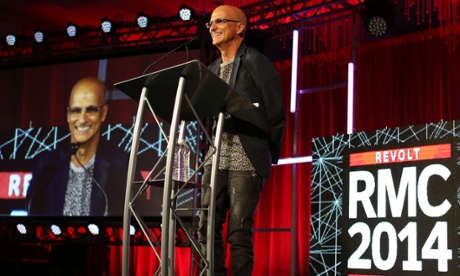
Beats was nearly a brand worn on the feet rather than the head. According to the company co-founder and now Apple employee Jimmy Iovine, the genesis of the Beats headphone brand with rap star Dr. Dre originally started with the idea of making trainers.
Accepting an award at the Revolt music conference in Miami, Florida, the 61-year-old Iovine on Tuesday used the spotlight to talk about Steve Jobs, Beats headphones and to say that the distribution of music must be improved otherwise music is likely to lose its inherent value in society.
“I met Steve Jobs and the team at Apple, and I thought: this is where cool lives right now. The party is at Steve’s house,” explained Iovine. “This was a man who understood the lyrics, who understood the music, who understood The Beatles and Bob Dylan, but who also in a visionary way, truly understood lifestyle and technology.
“In other words, this was a great and dangerous man who I quickly decided to make my friend.”
Iovine was a key player in the negotiations over the setup of Apple’s iTunes Music Store in 2003, when he was at Interscope, a label inside Universal Music. After discussions with Jobs, he backed the idea of licensing per-song downloads, and pressed Doug Morris, Universal’s head, to sign with Apple.
‘Let’s not do sneakers – let’s do speakers’
Years later Dre was approached by his own lawyer Peter Paterno, who suggested setting up a trainer brand to expand Dre’s personal business with merchandise. Dre told Iovine, who decided sneakers weren’t where the future lay for music brand expansion.
“The shining example of Steve Jobs and his company stuck in my head,” Iovine explained. “I said, ‘Dre, let’s not do sneakers – let’s do speakers.’”
Beats originally saw Iovine and Dre team up with Monster, then primarily a cable manufacturer. Beats later split from Monster, and was bought by Apple in May for $3bn, the iPhone maker’s largest-ever acquisition.
Beats had also developed a streaming music service, Beats Music, before the Apple purchase, promising on-demand music curated by music professionals and critics. That was an attempt to change the way music was distributed, but Iovine believes more is needed.
Don’t stop the music
“The great artists of music have always innovated and boldly changed the game, but the industry itself has not,” he explained. “Too often, the music business allowed third-party companies to innovate for us – and that simply does not work any more.”
Apple was one of those companies; from its opening in April 2003, the iTunes Music Store became the largest music vendor online or offline in the US by 2008.
“We must face the fact that our delivery and distribution systems are too sterile and not compelling enough for a new generation of young people who love music in their own way,” warned Iovine. “If we don’t fix the distribution of music, we run the risk of music being sent out into the world in such an uninspired way that music loses its value – and not just its financial value, but even worse, its emotional value too – and therefore its position as arguably the most dominant art form going forward.
“Ladies and gentleman, the time has come for the music business itself to innovate.”
Despite once being part of the music industry, Iovine now has different allegiances as an Apple employee. Apple hasn’t said yet what it will do with Beats: “We closed the Beats transition in July and we’re off to a great start with some wonderful plans we’ll share with you in the future,” was all that chief executive Tim Cook would say in the recent quarterly earnings call.
Apple is however expected to apply downward pressure on music subscription prices by lowering Beats Music contracts to $5 a month, pushing music labels for more extensive price cuts to achieve that price.
The most valuable iTunes users spend an average of $60 buying music downloads in a year, which equates to $5 a month. But many people buy far less, and so can’t be tempted with subscription packages that cost more. With the shift to streaming, though, Apple risks losing those download buyers to rival companies such as Spotify.
Apple’s argument is that pricing subscription services at $5 a month will mean labels earn the same amount of money as they would from music purchasers.
• Apple will not shut down Dr Dre’s Beats Music but could fold it into iTunes

